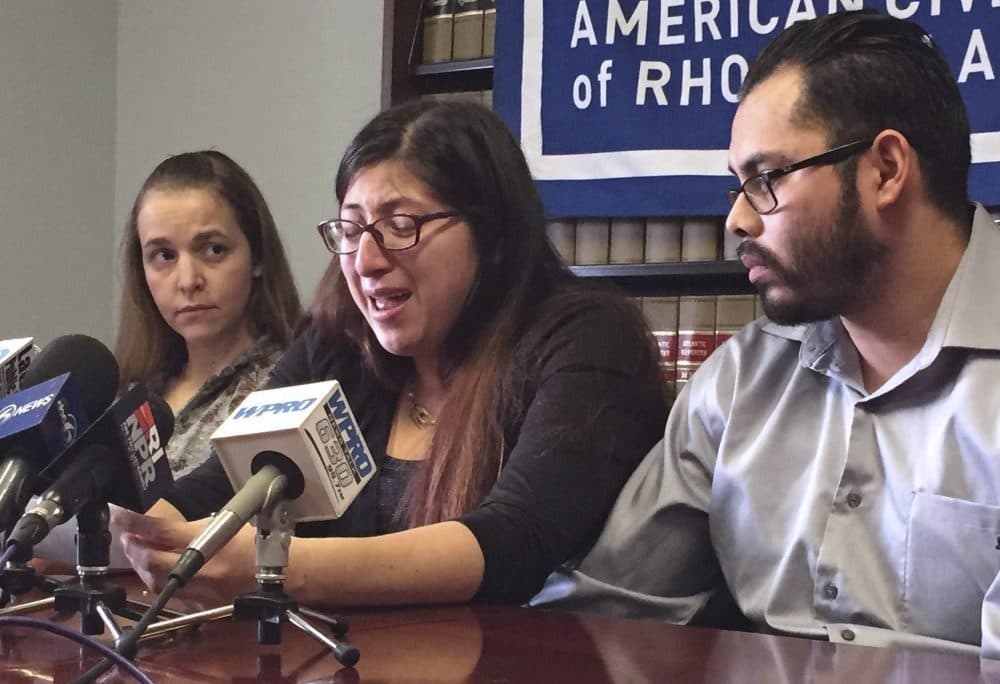Advertisement
Commentary
30 Mass. Cities And Towns Have Said ‘No’ To Trump’s Anti-Immigrant Policies. Will The State Act?

Look under the hood of the Trump deportation machine, and you’ll find a big, hungry engine fueled by human suffering.
Earlier this month, Attorney General Jeff Sessions set case quotas for immigration judges. The new rules, according to a memo sent to the judges, ostensibly will “relieve” a backlog of immigration cases, and speed deportations, by requiring immigration judges to complete at least 700 cases a year and to have fewer than 15 percent of their decisions overturned on appeal.
Judges and attorneys alike agree that assembly-line justice like this is a threat to judicial independence and due process rights for immigrants and their families. The new rules pressure immigration judges — the only judges in the country who report to the executive branch — to resolve cases quickly, thus prioritizing speed over justice.
Pressing every judge to complete three cases per day ignores the fact that immigration cases are varied in complexity and, therefore, varied in the length of time required to adjudicate them. Forced to meet the 700-case quota, judges will be pushed to resolve cases swiftly at the expense of fully hearing evidence. Too often, that means separating families, detaining the wrong people, and sending people to their home countries where they may be subject to human rights abuse and even death.
Here’s another new cog in the deportation machine: despite government regulations issued by the U.S. Citizenship and Immigration Service (USCIS) that invite noncitizen spouses of U.S. citizens to pursue lawful immigration status based on their marriages, another agency, the Immigration and Customs Enforcement (ICE), recently started to detain and seek to remove noncitizen spouses of U.S. citizens, as they take the lawful steps to become legal resident and citizens.
As the hand of one government agency beckons immigrants forward, its other hand nabs people, tearing them from their children and families to hold them in U.S. detention centers.
The “backlog” of immigration cases that the Attorney General rails against are mothers, fathers, children, friends, neighbors, colleagues who are seeking to stay in the United States — and often have a right to do so. The human impact of the Trump administration’s mass deportations is profound.
Take, for example, Lilian Calderon, a Guatemalan immigrant who came to the U.S. at the age of 3. Her husband, Luis, is a U.S. citizen, and together they have two young children, ages 1 and 4. She has never been in trouble with the law. Lilian and Luis made an appointment at a local USCIS office to have their marriage recognized, as the first step toward obtaining her citizenship. Although USCIS declared their marriage legitimate, Lilian was detained without warning by ICE agents who showed up at the marriage interview. Out of the blue, Lilian was handcuffed and detained.
For more than a month, Lilian was kept in detention, while her children suffered nightmares and separation anxiety at the sudden disappearance of their mother. Only after the ACLU of Massachusetts challenged her detention in federal court was Lilian released from jail and reunited with her family, while she seeks to vindicate her legal rights to stay here with her loved ones.
Or, consider Lucimar de Souza, another mother, who like Lilian, appeared for an interview with her husband, also a U.S. citizen, to confirm their marriage, the first step in a process of seeking lawful immigration status. Immediately after the interview — and despite the approval of the marriage petition — Lucimar was detained and taken to a detention center in Boston, where she remains today. Her 10-year-old son has begged to be allowed to stay with his mother, in detention, rather than return home without her.
These assaults on immigrant mothers and families, along with efforts to expedite the judicial process with case quotas, are attacks on human rights and on the values of fairness and due process upon which our nation was founded.
The ACLU of Massachusetts, along with the law firm WilmerHale, filed a class action lawsuit on behalf of Lilian, Lucimar and other families whose lives have been torn apart by illegal detention and deportation. We are suing President Trump and officials in his administration in an effort to protect people and keep families together.
But Massachusetts doesn’t have to wait for the courts to act. It’s time our lawmakers also took steps to stop local and state law enforcement from collaborating with the administration’s deportation efforts. Already, 30 cities and towns in Massachusetts have declared themselves to be “welcoming cities” for immigrants. Local law enforcement in those localities is focused on building trust with immigrant communities, rather than acting as agents to enforce Trump’s anti-immigrant policies.
We should continue to press our lawmakers to take steps -- such as passing the Safe Communities Act — to send a clear message to President Trump that Massachusetts will not support his administration’s mass deportation efforts. Massachusetts should be led by our values, not by fear-mongering. We have the opportunity and obligation to defend human rights and due process for all residents of our Commonwealth.
